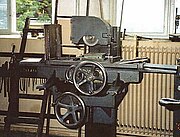Butler Machine Tool Co Ltd v Ex-Cell-O Corp Ltd
| Butler Machine Tool Co Ltd v Ex-Cell-O Corp Ltd | |
|---|---|
 |
|
| Court | Court of Appeal |
| Citation(s) | [1977] EWCA Civ 9, [1979] 1 WLR 401 |
| Court membership | |
| Judge(s) sitting | Lord Denning MR, Lawton LJ and Bridge LJ |
| Keywords | |
| Mirror image rule, counter offer, standard form contracts | |
Butler Machine Tool Co Ltd v Ex-Cell-O Corp Ltd [1977] EWCA Civ 9 is a leading English contract law case. It concerns the problem found among some large businesses, with each side attempting to get their preferred standard form agreements to be the basis for a contract.
Butler Machine Tool Co Ltd made and sold machine tools. They sent a letter to Ex-Cell-O on May 23, 1969 offering Ex-Cell-O some new machinery for £75,535. With it were Butler's standard contract terms. These included a price variation clause, so that if their manufacturing costs went up, the price rise would be passed on to Ex-Cell-O. Ex-Cell-O replied on May 27 and said they would order the machinery, but on Ex-Cell-O's own standard terms. Ex-Cell-O's standard terms did not have a price variation clause. Butler replied on June 5. It replied on the tear-off slip from Ex-Cell-O's terms. At the bottom of this slip it read, "We accept your order on the terms and conditions stated therein." But Butler added a letter reasserting that the deal was being made under Butler's own terms, from the May 23 letter. A while later, nothing further had been said, and Butler delivered the machinery. They asked for £75,535, plus £2,892 according to their price variation clause. Ex-Cell-O refused to pay the extra. Butler sued Ex-Cell-O.
The Court of Appeal held that the contract was on Ex-Cell-O's terms, and therefore the increase in price was ineffective. The majority followed a traditional offer and acceptance analysis. But Lord Denning MR's judgment took the approach that one should look for material agreement and the court should have the power to ignore irreconcilable terms. His judgment led as follows.
The defendant buyers, Ex-Cell-O Corporation (England) Ltd., rejected the excess charge. They relied on their own terms and conditions. They said:
"We did not accept the sellers' quotation as it was. We gave an order for the self-same machine at the self-same price, but on the back of our order we had our own terms and conditions. Our terms and conditions did not contain any price variation clause."
The judge held that the price variation clause in the sellers' form continued through the whole dealing and so the sellers were entitled to rely upon it. He was clearly influenced by a passage in Anson's Law of Contract , 24th ed. (1975), pp. 37 and 38, of which the editor is Professor Guest: and also by Treitel, The Law of Contract, 4th ed. (1975), p. 15. The judge said that the sellers did all that was necessary and reasonable to bring the price variation clause to the notice of the buyers. He thought that the buyers would not "browse over the conditions" of the sellers: and then, by printed words in their (the buyers') document, trap the sellers into a fixed price contract.
...
Wikipedia
